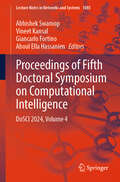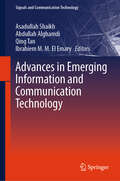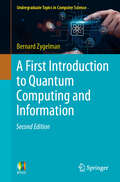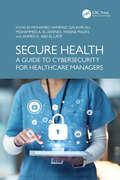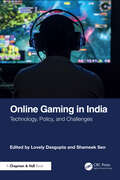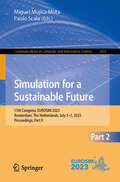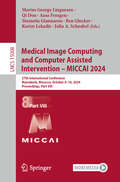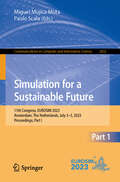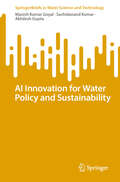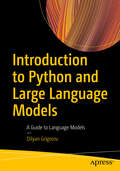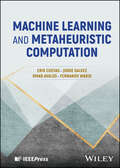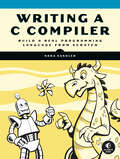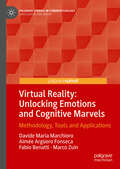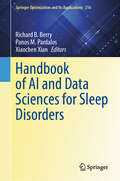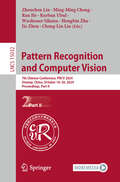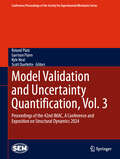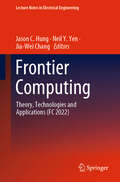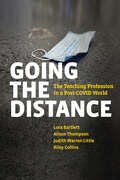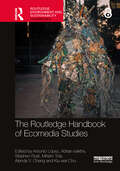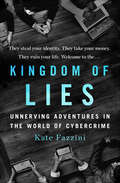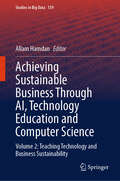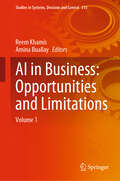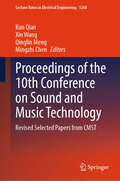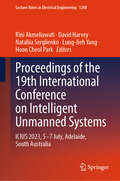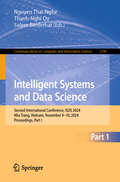- Table View
- List View
Proceedings of Fifth Doctoral Symposium on Computational Intelligence: DoSCI 2024, Volume 4 (Lecture Notes in Networks and Systems #1085)
by Giancarlo Fortino Aboul Ella Hassanien Abhishek Swaroop Vineet KansalThis book features high-quality research papers presented at Fifth Doctoral Symposium on Computational Intelligence (DoSCI 2024), jointly organized by Institute of Engineering & Technology, Lucknow, India, and School of Open Learning, University of Delhi, in association with University of Calabria, Italy, on May 10, 2024. This book discusses the topics such as computational intelligence, artificial intelligence, deep learning, evolutionary algorithms, swarm intelligence, fuzzy sets and vague sets, rough set theoretic approaches, quantum-inspired computational intelligence, hybrid computational intelligence, machine learning, computer vision, soft computing, distributed computing, parallel and grid computing, cloud computing, high-performance computing, biomedical computing, and decision support and decision-making.
Advances in Emerging Information and Communication Technology (Signals and Communication Technology)
by Ibrahiem M. M. El Emary Asadullah Shaikh Abdullah Alghamdi Qing TanThe book presents the proceedings of the International Conference on Innovation of Emerging Communication and Information Technology (ICIEICT 2023), which took place September 11 to 13, 2023, virtually and in Madrid, Spain. The conference is devoted to communication, computer science, electrical and electronics engineering, telecommunication engineering, and information technology. The conference is intended to provide a forum for research scientists, engineers, educators, and practitioners throughout the world to learn, share knowledge, publish, and disseminate the most recent innovations and developments, ideas, and applications in all fields of science, technology and information technology.
A First Introduction to Quantum Computing and Information (Undergraduate Topics in Computer Science)
by Bernard ZygelmanThis textbook addresses and introduces new developments in the field of quantum information and computing (QIC) for a primary audience of undergraduate students. Developments over the past few decades have spurred the need for QIC courseware at major research institutions. To address this, the present 2nd edition of a highly accessible textbook/reference broadens the exposure of QIC science for the undergraduate market. The subject matter is introduced in such a way so that it is accessible to students with only a first-year calculus background. Greater accessibility allows a broader range of academic offerings. Topics and features: Introduces beginning undergraduate students to quantum theory and developments in QIC, without exposure to upper-level physics and mathematics Contains a new chapter on Adiabatic Quantum Computing Integrates Mathematica-based software examples and projects, which offers a “hands-on" experience and facilitates navigation of difficult abstract concepts Offers helpful links to additional exercises, problems, and solution manuals Facilitates a more holistic approach to the teaching of difficult concepts, incorporating symbolic manipulation software Provides new material on Quantum Error Correction Allows a broad-range of course offerings spanning physics, engineering, math and computer science This unique introductory textbook can serve courses offered in university physics, engineering, math, and definitely computer science departments. Use of Mathematica software allows a fast learning curve for students who have limited experience with scientific programming.
Secure Health: A Guide to Cybersecurity for Healthcare Managers
by Yassine Maleh Ahmed A. Abd El-Latif Mohamed Hammad Gauhar Ali Mohammed A. El-AffendiIn today’s interconnected world, healthcare systems are increasingly turning to digital technologies to enhance patient care and optimize operations. However, this digital transformation presents significant challenges in guaranteeing the security and privacy of sensitive healthcare data. Secure Health: A Guide to Cybersecurity for Healthcare Managers confronts these challenges head-on, offering a comprehensive exploration of the latest advancements and best practices in securing digital health systems.From examining the convergence of Internet of Things (IoT) applications with healthcare privacy and security to investigating ethical hacking frameworks and biometric access management, each chapter delves into valuable insights for safeguarding healthcare data in an ever-more digitized landscape. What sets this book apart is its holistic perspective, encompassing not only technical aspects but also governance standards, the unique cybersecurity challenges of telehealth, and the optimization of healthcare supply chain management.KEY FEATURES:• Explores the integration of IoT devices into healthcare and the associated privacy and security risks.• Examines security frameworks and best practices for e-health information governance.• Introduces a novel framework for ethical hacking in digital health.• Analyzes the effectiveness of different artificial intelligence (AI) models for botnet traffic classification.• Delves into the unique challenges of securing telehealth and remote monitoring systems.• Offers practical guidance on securing the future of e-health through smart sensor network management.
Online Gaming in India: Technology, Policy, and Challenges
by Lovely Dasgupta Shameek SenThis book offers a comprehensive overview from diverse perspectives of online gaming technology, policy, and experiments to understand and review the Indian approach. It starts with the technological viewpoint on the governance and regulation of online gaming and includes the Indian experiment in governing and regulating it. The book brings a nuanced approach related to the perspectives of various stakeholders, the players, the developers, the gamers, the regulators, the law enforcement agencies, the industry and most importantly, the consumers, who are also the intended audience of the work. Present a holistic view of the online gaming industry from technical, legal and policymaking perspectives Offers critical technical highlights include Online transactions, online games ecosystem, online games varied platforms, web3, metaverse, AI and Fantasy Games Includes a comparative analysis to evaluate better the laws, rules, and regulations and the governance of online gaming in India Encapsulates the Indian experience in intervening and streamlining the online gaming industry The book is for Professionals and scholars in the fields of Online Gaming in computer science, Law, and other related discipline. It also serves as a textbook for students for Online Gaming courses.
Simulation for a Sustainable Future: 11th Congress, EUROSIM 2023, Amsterdam, The Netherlands, July 3–5, 2023, Proceedings, Part II (Communications in Computer and Information Science #2033)
by Miguel Mujica Mota Paolo ScalaThe two volume set CCIS 2032 and 2033 constitutes the proceedings of the 11th Congress on Simulation for a Sustainable Future, EUROSIM 2023, which was held in Amsterdam, The Netherlands, during July 3–5, 2023. The 47 full papers included in the proceedings were carefully reviewed and selected from 99 submissions. The papers are divided in the following topical sections: environmental sustainability; healthcare; production systems; business and industries; logistics and transportation systems; monitor, control, and theoretical systems.
Medical Image Computing and Computer Assisted Intervention – MICCAI 2024: 27th International Conference, Marrakesh, Morocco, October 6–10, 2024, Proceedings, Part VIII (Lecture Notes in Computer Science #15008)
by Marius George Linguraru Aasa Feragen Ben Glocker Julia A. Schnabel Karim Lekadir Qi Dou Stamatia GiannarouThe 12-volume set LNCS 15001 - 15012 constitutes the proceedings of the 27th International Conferenc on Medical Image Computing and Computer Assisted Intervention, MICCAI 2024, which took place in Marrakesh, Morocco, during October 6–10, 2024. MICCAI accepted 857 full papers from 2781 submissions. They focus on neuroimaging; image registration; computational pathology; computer aided diagnosis, treatment response, and outcome prediction; image guided intervention; visualization; surgical planning, and surgical data science; image reconstruction; image segmentation; machine learning; etc.
Simulation for a Sustainable Future: 11th Congress, EUROSIM 2023, Amsterdam, The Netherlands, July 3–5, 2023, Proceedings, Part I (Communications in Computer and Information Science #2032)
by Miguel Mujica Mota Paolo ScalaThe two volume set CCIS 2032 and 2033 constitutes the proceedings of the 11th Congress on Simulation for a Sustainable Future, EUROSIM 2023, which was held in Amsterdam, The Netherlands, during July 3–5, 2023. The 47 full papers included in the proceedings were carefully reviewed and selected from 99 submissions. The papers are divided in the following topical sections: environmental sustainability; healthcare; production systems; business and industries; logistics and transportation systems; monitor, control, and theoretical systems.
AI Innovation for Water Policy and Sustainability (SpringerBriefs in Water Science and Technology)
by Manish Kumar Goyal Akhilesh Gupta Sachidanand KumarIn the face of unprecedented challenges in managing water resources, the integration of artificial intelligence (AI) emerges as a revolutionary force, reshaping the landscape of water conservation, treatment, irrigation, policy formulation, watershed management, and the monitoring of groundwater and surface water. This book explores the transformative role of AI in the water domain, exploring cutting-edge applications and innovative solutions that promise to address pressing issues in sustainable water management. As we navigate the complexities of a changing climate, population growth, and urbanization, the chapters within this book offer insights into how AI technologies can enhance efficiency, optimize resource utilization, and provide data-driven strategies for ensuring the resilience and sustainability of our vital water ecosystems. From intelligent water treatment systems to precision agriculture and policy decision support, each chapter unfolds a narrative of AI-driven advancements, providing a comprehensive guide for researchers, practitioners, and policymakers navigating the intersection of artificial intelligence and water management.
Introduction to Python and Large Language Models: A Guide to Language Models
by Dilyan GrigorovGain a solid foundation for Natural Language Processing (NLP) and Large Language Models (LLMs), emphasizing their significance in today’s computational world. This book is an introductory guide to NLP and LLMs with Python programming. The book starts with the basics of NLP and LLMs. It covers essential NLP concepts, such as text preprocessing, feature engineering, and sentiment analysis using Python. The book offers insights into Python programming, covering syntax, data types, conditionals, loops, functions, and object-oriented programming. Next, it delves deeper into LLMs, unraveling their complex components. You’ll learn about LLM elements, including embedding layers, feedforward layers, recurrent layers, and attention mechanisms. You’ll also explore important topics like tokens, token distributions, zero-shot learning, LLM hallucinations, and insights into popular LLM architectures such as GPT-4, BERT, T5, PALM, and others. Additionally, it covers Python libraries like Hugging Face, OpenAI API, and Cohere. The final chapter bridges theory with practical application, offering step-by-step examples of coded applications for tasks like text generation, summarization, language translation, question-answering systems, and chatbots. In the end, this book will equip you with the knowledge and tools to navigate the dynamic landscape of NLP and LLMs. What You’ll Learn Understand the basics of Python and the features of Python 3.11 Explore the essentials of NLP and how do they lay the foundations for LLMs. Review LLM components. Develop basic apps using LLMs and Python. Who This Book Is For Data analysts, AI and Machine Learning Experts, Python developers, and Software Development Professionals interested in learning the foundations of NLP, LLMs, and the processes of building modern LLM applications for various tasks.
Machine Learning and Metaheuristic Computation
by Erik Cuevas Omar Avalos Jorge Galvez Fernando WarioLearn to bridge the gap between machine learning and metaheuristic methods to solve problems in optimization approaches Few areas of technology have greater potential to revolutionize the globe than artificial intelligence. Two key areas of artificial intelligence, machine learning and metaheuristic computation, have an enormous range of individual and combined applications in computer science and technology. To date, these two complementary paradigms have not always been treated together, despite the potential of a combined approach which maximizes the utility and minimizes the drawbacks of both. Machine Learning and Metaheuristic Computation offers an introduction to both of these approaches and their joint applications. Both a reference text and a course, it is built around the popular Python programming language to maximize utility. It guides the reader gradually from an initial understanding of these crucial methods to an advanced understanding of cutting-edge artificial intelligence tools. The text also provides: Treatment suitable for readers with only basic mathematical trainingDetailed discussion of topics including dimensionality reduction, clustering methods, differential evolution, and moreA rigorous but accessible vision of machine learning algorithms and the most popular approaches of metaheuristic optimization Machine Learning and Metaheuristic Computation is ideal for students, researchers, and professionals looking to combine these vital methods to solve problems in optimization approaches.
Writing a C Compiler: Build a Real Programming Language from Scratch
by Nora SandlerA fun, hands-on guide to writing your own compiler for a real-world programming language.Compilers are at the heart of everything programmers do, yet even experienced developers find them intimidating. For those eager to truly grasp how compilers work, Writing a C Compiler dispels the mystery. This book guides you through a fun and engaging project where you&’ll learn what it takes to compile a real-world programming language to actual assembly code.Writing a C Compiler will take you step by step through the process of building your own compiler for a significant subset of C—no prior experience with compiler construction or assembly code needed. Once you&’ve built a working compiler for the simplest C program, you&’ll add new features chapter by chapter. The algorithms in the book are all in pseudocode, so you can implement your compiler in whatever language you like. Along the way, you&’ll explore key concepts like:Lexing and parsing: Learn how to write a lexer and recursive descent parser that transform C code into an abstract syntax tree.Program analysis: Discover how to analyze a program to understand its behavior and detect errors.Code generation: Learn how to translate C language constructs like arithmetic operations, function calls, and control-flow statements into x64 assembly code.Optimization techniques: Improve performance with methods like constant folding, dead store elimination, and register allocation. Compilers aren&’t terrifying beasts—and with help from this hands-on, accessible guide, you might even turn them into your friends for life.
Virtual Reality: Methodology, Tools and Applications (Palgrave Studies in Cyberpsychology)
by Fabio Benatti Davide Maria Marchioro Aimée Argüero Fonseca Marco ZuinThis book is an invaluable resource for researchers, practitioners, and enthusiasts interested in unraveling the potential and promises of virtual reality, delving into its applications, challenges, and the exciting path that lies ahead. In the age of rapidly advancing technology, the intersection of psychology and virtual reality (VR) has opened doors to a world of unprecedented possibilities. This introduction sets the stage for an exploration of the potential of virtual reality within the field of psychology and its intriguing relationship with cyberpsychology. In this book, the authors aim to utilize the transformative power of VR to enhance our understanding of the human mind and emotions, ultimately contributing to the betterment of psychological science and the human experience. The ability to simulate environments, elicit emotional responses, and assess cognitive functions in a controlled, replicable manner presents a paradigm shift in psychological research and practice.
Handbook of AI and Data Sciences for Sleep Disorders (Springer Optimization and Its Applications #216)
by Panos M. Pardalos Richard B. Berry Xiaochen XianThe rise of lifestyle changes resulting from constant connectivity, irregular work schedules, heightened stress, and disruptive sleep patterns, have contributed to increasing insomnia rates. Exacerbated by the COVID-19 pandemic, sleep disorders are more prevalent than ever. This handbook offers a comprehensive exploration of the fusion of Artificial Intelligence (AI) and data science within the realm of sleep disorders, presenting innovative approaches to diagnosis, treatment, and personalized care. The interdisciplinary nature of this handbook fosters collaboration between experts from diverse fields, including computer science, engineering, neuroscience, medicine, public health, AI, data science, and sleep medicine. Each chapter delves into specific aspects of sleep disorder analysis, innovative methodologies, novel insights, and real-world applications that showcase the transformative potential of AI and data science in sleep medicine, from analyzing sleep patterns and predicting disorder risk factors to utilizing big data analytics for large-scale epidemiological studies. This handbook hopes to offer a comprehensive resource for researchers, clinicians, and policymakers striving to address the challenges in sleep medicine.
Pattern Recognition and Computer Vision: 7th Chinese Conference, PRCV 2024, Urumqi, China, October 18–20, 2024, Proceedings, Part II (Lecture Notes in Computer Science #15032)
by Ran He Jie Zhou Cheng-Lin Liu Ming-Ming Cheng Kurban Ubul Hongbin Zha Zhouchen Lin Wushouer SilamuThis 15-volume set LNCS 15031-15045 constitutes the refereed proceedings of the 7th Chinese Conference on Pattern Recognition and Computer Vision, PRCV 2024, held in Urumqi, China, during October 18–20, 2024. The 579 full papers presented were carefully reviewed and selected from 1526 submissions. The papers cover various topics in the broad areas of pattern recognition and computer vision, including machine learning, pattern classification and cluster analysis, neural network and deep learning, low-level vision and image processing, object detection and recognition, 3D vision and reconstruction, action recognition, video analysis and understanding, document analysis and recognition, biometrics, medical image analysis, and various applications.
Model Validation and Uncertainty Quantification, Vol. 3: Proceedings of the 42nd IMAC, A Conference and Exposition on Structural Dynamics 2024 (Conference Proceedings of the Society for Experimental Mechanics Series)
by Roland Platz Garrison Flynn Kyle Neal Scott OuelletteModel Validation and Uncertainty Quantification, Volume 3: Proceedings of the 42nd IMAC, A Conference and Exposition on Structural Dynamics, 2024, the third volume of ten from the Conference brings together contributions to this important area of research and engineering. The collection presents early findings and case studies on fundamental and applied aspects of Model Validation and Uncertainty Quantification, including papers on: Uncertainty Quantification in Dynamics Fusion of Test and Analysis Model Form Uncertainty: Round Robin Challenge UQVI (Uncertainty Quantification in Vibration Isolation) Recursive Bayesian System Identification Virtual Sensing & Realtime Monitoring Surrogate Modeling and Reduced Order Models
Frontier Computing: Theory, Technologies and Applications (FC 2022) (Lecture Notes in Electrical Engineering #1031)
by Neil Y. Yen Jason C. Hung Jia-Wei ChangThis book gathers the proceedings of the 12th International Conference on Frontier Computing, held in Tokyo, Japan, on July 12–15, 2022, and provides comprehensive coverage of the latest advances and trends in information technology, science, and engineering. It addresses a number of broad themes, including communication networks, business intelligence and knowledge management, Web intelligence, and related fields that inspire the development of information technology. The respective contributions cover a wide range of topics: database and data mining, networking and communications, Web and Internet of things, embedded systems, soft computing, social network analysis, security and privacy, optical communication, and ubiquitous/pervasive computing. Many of the papers outline promising future research directions, and the book benefits students, researchers, and professionals alike. Further, it offers a useful reference guide for newcomers to the field.
Going the Distance: The Teaching Profession in a Post-COVID World
by Lora Bartlett Judith Warren Little Alisun Thompson Riley CollinsAn unflinching yet ultimately hopeful appraisal of the workplace factors that determine career risk and resilience among K–12 teachers, informed by the lessons of the COVID-19 crisis
The Routledge Handbook of Ecomedia Studies (Routledge Environment and Sustainability Handbooks)
by Miriam Tola Stephen Rust Adrian Ivakhiv Alenda Y. Chang Antonio López Kiu-Wai ChuThe Routledge Handbook of Ecomedia Studies gathers leading work by critical scholars in this burgeoning field. Redressing the lack of environmental perspectives in the study of media, ecomedia studies asserts that media are in and about the environment, and environments are socially and materially mediated.The book gives form to this new area of study and brings together diverse scholarly contributions to explore and give definition to the field. The Handbook highlights five critical areas of ecomedia scholarship: ecomedia theory, ecomateriality, political ecology, ecocultures, and eco-affects. Within these areas, authors navigate a range of different topics including infrastructures, supply and manufacturing chains, energy, e-waste, labor, ecofeminism, African and Indigenous ecomedia, environmental justice, environmental media governance, ecopolitical satire, and digital ecologies. The result is a holistic volume that provides an in-depth and comprehensive overview of the current state of the field, as well as future developments.This volume will be an essential resource for students, educators, and scholars of media studies, cultural studies, film, environmental communication, political ecology, science and technology studies, and the environmental humanities.The Open Access version of this book, available at www.taylorfrancis. com, has been made available under a Creative Commons Attribution-Non Commercial-No Derivatives (CC-BY-NC-ND) 4.0 license. Deep gratitude for the generous support of those institutions that provided funding to enable this volume to be available simultaneously in print and open access: University of Oregon Libraries Open Access Publishing Award, Frank J. Guarini School of Busi-ness at John Cabot University, University of Vermont Humanities Center, University of California Santa Barbara, University of Lausanne, and School of Humanities at Nanyang Technological University.
Kingdom of Lies: Unnerving Adventures in the World of Cybercrime
by Kate Fazzini“Wow. Kate Fazzini is the rare top-level reporter who can make you see, smell and feel a hidden world, not just understand it. Cybercrime (and security) has found its Michael Lewis.” —Bret Witter, co-author of the #1 NYT bestseller The Monuments MenOne of BookRiot's "50 of the Best Books to Read This Summer"In the tradition of Michael Lewis and Tom Wolfe, a fascinating and frightening behind-the-scenes look at the interconnected cultures of hackers, security specialists, and law enforcementA 19-year-old Romanian student stumbles into a criminal ransomware ring in her village. Soon she is extorting Silicon Valley billionaires for millions--without knowing the first thing about computers.A veteran cybersecurity specialist has built a deep network of top notch hackers in one of the world’s largest banks. But then the bank brings in a cadre of ex-military personnel to “help.” A cynical Russian only leaves his tiny New Jersey apartment to hack sports cars at a high performance shop in Newark. But he opens his door to a consultant who needs his help. A hotel doorman in China once served in the People’s Army, stealing intellectual property from American companies. Now he uses his skills to build up a private side-business selling the data he takes from travelers to Shanghai’s commercial center. Kingdom of Lies follows the intertwined stories of cybercriminals and ethical hackers as they jump from criminal trend to criminal trend, crisis to crisis. A cybersecurity professional turned journalist, Kate Fazzini illuminates the many lies companies and governments tell us about our security, the lies criminals tell to get ahead, and the lies security leaders tell to make us think they are better at their jobs than they are.Like Traffic set in the cybercrime world, Kingdom of Lies is as entertaining as it is eye opening.
Achieving Sustainable Business Through AI, Technology Education and Computer Science: Volume 2: Teaching Technology and Business Sustainability (Studies in Big Data #159)
by Allam HamdanThis book delves into the relationship between artificial intelligence, technology education, and computer science intersect with sustainable business practices. This book discovers the transformative potential of cutting-edge technologies like artificial intelligence, machine learning, and blockchain across diverse sectors such as health care, education, government services, and digital transformation.
AI in Business: Volume 1 (Studies in Systems, Decision and Control #515)
by Reem Khamis Amina BuallayThis book is a comprehensive guide to understanding the potential of artificial intelligence (AI) in improving business functions, as well as the limitations and challenges that come with its implementation. In this book, readers will learn about the various opportunities that AI presents in business, including how it can automate routine tasks, reduce errors, and increase efficiency. The book covers a range of topics, including how AI can be used in financial reporting, auditing, fraud detection, and tax preparation. However, the book also explores the limitations of AI in business, such as the need for skilled professionals, data quality, and the potential for bias. It examines the challenges that companies face when implementing AI in business functions, including the need for ethical considerations, transparency, and accountability. The book is written for business professionals, business leaders, and anyone interested in the potential of AI in business functions. It offers practical advice on how to implement AI effectively and provides insights into the latest developments in AI technology. Through case studies and real-world examples, readers will gain a deeper understanding of how AI can be used to enhance business functions, as well as the potential pitfalls and limitations to be aware of. Overall, "AI in Business: Opportunities and Limitations" is an essential guide for anyone looking to harness the power of AI to improve their business functions, and to stay ahead in an increasingly competitive business environment.
Proceedings of the 10th Conference on Sound and Music Technology: Revised Selected Papers from CMST (Lecture Notes in Electrical Engineering #1268)
by Xin Wang Kun Qian Qinglin Meng Mingzhi ChenThe book presents selected papers at the 10th Conference on Sound and Music Technology (CSMT) held in June 2023, China. CSMT is a multidisciplinary conference focusing on audio processing and understanding with bias on music and acoustic signals. The primary aim of the conference is to promote the collaboration between art society and technical society in China. In this book, the paper included covers a wide range topic from speech, signal processing, music understanding, machine learning, and signal processing for advanced medical diagnosis and treatment applications, which demonstrates the target of CSMT merging arts and science research together. Its content caters to scholars, researchers, engineers, artists, and education practitioners not only from academia but also industry, who are interested in audio/acoustics analysis signal processing, music, sound, and artificial intelligence (AI).
Proceedings of the 19th International Conference on Intelligent Unmanned Systems: ICIUS 2023, 5–7 July, Adelaide, South Australia (Lecture Notes in Electrical Engineering #1248)
by David Harvey Lung-Jieh Yang Rini Akmeliawati Nataliia Sergiienko Hoon Cheol ParkThis book contains selected high-quality reviewed papers that have been accepted and presented at the 19th International Conference of Intelligent Unmanned Systems (ICIUS 2023), which was held in Adelaide, Australia, on 5–7 July 2023. The book is composed of articles that cover the advanced progress in unmanned systems, such as bio-inspired, underwater, aerial, and off-earth systems, as well as their subsystems, including control and navigation, communication, and machine vision systems. The book is suitable for researchers, engineers, graduates, and hobbyists who have interest in intelligent unmanned systems and their advances.
Intelligent Systems and Data Science: Second International Conference, ISDS 2024, Nha Trang, Vietnam, November 9–10, 2024, Proceedings, Part I (Communications in Computer and Information Science #2190)
by Salem Benferhat Nguyen Thai-Nghe Thanh-Nghi DoThis two-volume set constitutes the refereed proceedings of the Second International Conference, ISDS 2024, held in Nha Trang, Vietnam, during November 9–10, 2024. The 38 full papers and 10 short papers were carefully reviewed and selected from 129 submissions. They were categorized under the topical sections as follows: AI in E-Commerce, Agriculture, and Aquaculture; AI in Health Care Analytics; Big Data, IoT, and Cloud Computing; and Natural Language Processing.
